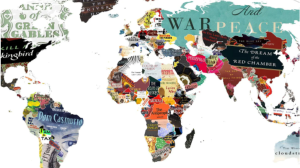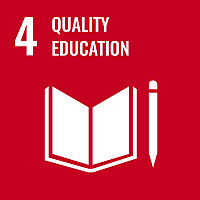Globally Engaged Literature
April 18, 2022
Jack Byrne

SDG 4: Quality Education
Exploring different perspectives is often a challenging task. Whether due to preconceived biases, social media algorithms, or simply a lack of time, people tend to just pick a side without giving much consideration to alternative views. We live in an era that makes it incredibly easy for someone to close themselves off to ideas that may shake up their worldview. However, this just makes it all the more rewarding when you manage to break out and expose yourself to outside ideas. Realizing that the billions of unique perspectives in the world are something to be embraced rather than shunned is a refreshing conclusion to come to.
Seeking out diverse views on the local level can certainly make for an illuminating experience, but it is not the only place to explore. Global perspectives can be even more impactful than local perspectives, as the gap to bridge between people of different nationalities is often larger. On the local level, among other things, there are people of different languages, races, ethnic groups, economic backgrounds, and political views. The global level includes all of these factors, but there are additional components as well. There may be larger cultural and political differences between the society you were brought up in and the one detailed in the perspective you are engaging with. These differences can initially seem unfamiliar, but by learning to engage and explore these perspectives one can become a more well rounded person globally.
I try to explore global perspectives through literature. While a story cannot provide a complete picture of a culture or society, it can offer perspectives that challenge you to consider something different from what you are used to. No matter where in the world you were brought up, everyone enjoys a good story. Though different cultures have varying methods of telling a story, the broader storytelling tradition is something that groups across the world have engaged in since humanity’s earliest days. It is something that everyone can truly relate to. While literature is far from the only storytelling medium, it is one of the major pillars of the art form. Like music, dance, and cinema, literature allows people to explore topics they are familiar with in a way which everyone can connect to. Reading literature provides an opportunity to explore perspectives that may broaden your worldview. Storytelling is something that has linked people throughout history, and literature is one of the ways through which this vital function is still served today.
Two novels that impacted me in a global way were 2666, by Roberto Bolaño, and One Hundred Years of Solitude, by Gabriel García Márquez. 2666 was probably the most impactful, but it is extremely difficult to choose between the two. Besides just being an amazing text that provides some of the 21st Century’s best passages of prose, 2666 exposes the reader to a seemingly limitless number of global views. There are characters living the violence and political machinations of Sonora, Mexico during the 1990’s, others struggling through the horror and destruction of post-war Europe, and some laying out the day-to-day lives of European academics. Each of these characters exposed me to a life and perspectives far different from my own. I gained an expanded understanding of the world and the unfamiliar challenges that so many go through on a daily basis. The text raised issues that I would never have considered before, and in doing so helped to make me a more globally engaged citizen.
2666 and One Hundred Years of Solitude are hardly the only globally engaged novels. There are countless texts that deal with topics and challenges with a worldwide scope. However, people can unknowingly avoid them, as we often enjoy stories that we can easily relate to. This tendency negates one of the most important values of literature. Successfully exchanging views requires people to break out of their comfort zones. If you only stick with what you’re familiar with, then you leave yourself without space to learn and grow. This rule holds true when it comes to literature– fulfilling an exchange of views is one of the main tools the form provides. By seeking out literature written by people from different backgrounds exploring views that challenge our own, each of us can satisfy a piece of our global education.
Jack Byrne
Literature ’25
Bolaño, R. (2008). 2666. Picador.
García Márquez, G. (2006). One Hundred Years of Solitude. Harper Perennial Modern Classics.
Jones, Will. “Literature Map of the World.” indy100, The Independent , 14 Mar. 2017.
